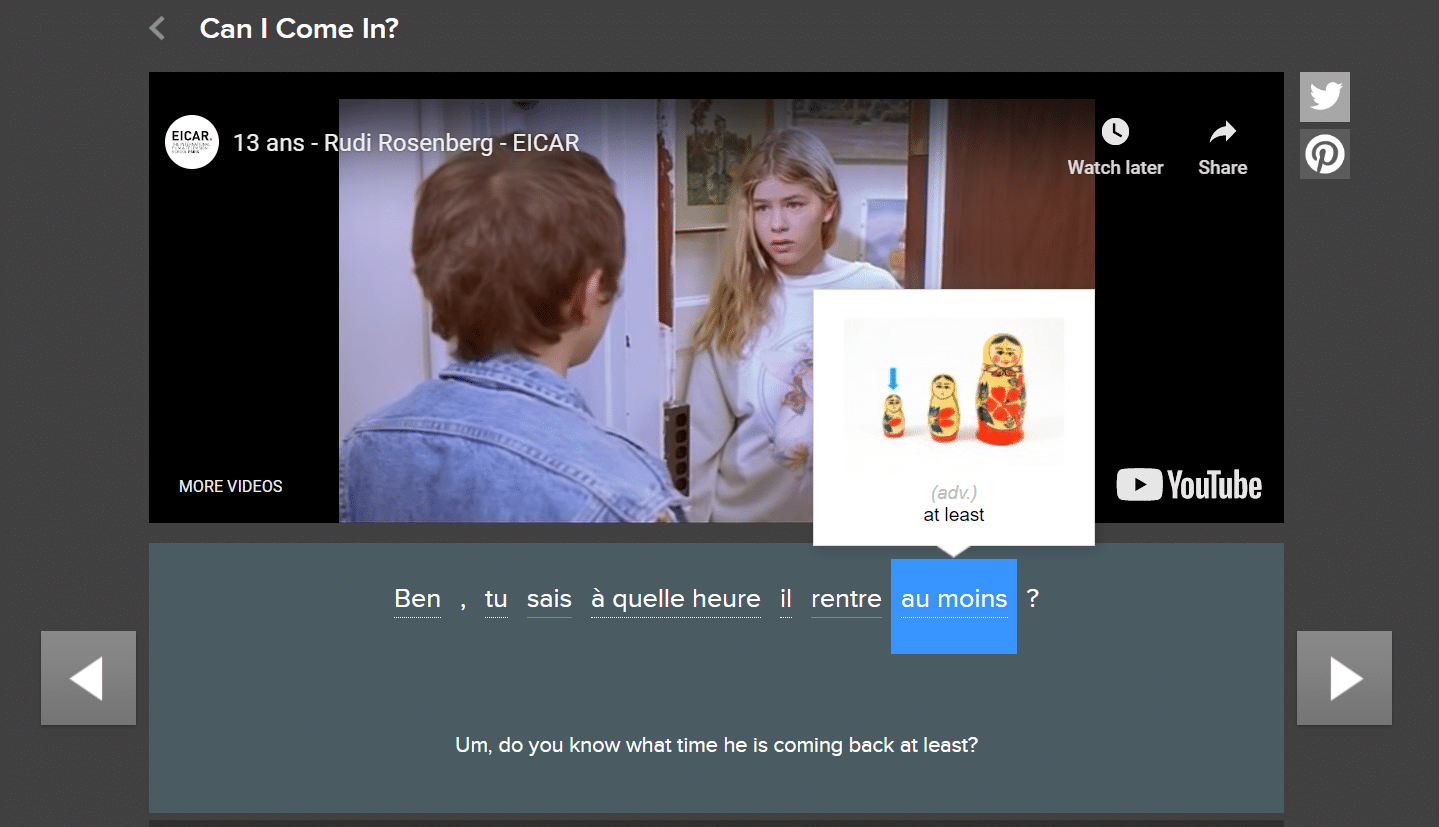
Is French Hard to Learn? 7 Common Concerns Debunked
The idea of learning a new language can be intimidating.
It might seem difficult, but learning French probably isn’t as hard as you think!
In fact, the Foreign Service Institute lists French as one of the easiest languages for English speakers to learn. French and English share a writing script, grammar concepts and origins for many words.
So, let’s look at some common fears about learning French and see why these aspects aren’t so scary after all.
Contents
- 1. French has a lot of silent letters
- 2. There are so many French verb tenses
- 3. Every French noun has a gender
- 4. French grammar is confusing
- 5. There are accent marks in French
- 6. French is just so different from English
- 7. Practicing French is difficult
Download: This blog post is available as a convenient and portable PDF that you can take anywhere. Click here to get a copy. (Download)
1. French has a lot of silent letters
You’ve probably seen French words such as beaucoup (a lot, many), which is pronounced like “bō-kü.” Or how about the word roux (red), in which the x is silent?
French is filled with silent letters, so how are you supposed to remember which to pronounce and which to ignore?
The good news is that French pronunciation rules are very consistent.
The p in beaucoup is silent, but in French, the letter p is always silent at the end of a word. If you see a double p with an unaccented e tagged on, such as in the word l’enveloppe (envelope), then you know to pronounce the p sound.
The eau in beaucoup may seem like a lot of letters just to make the “oh” sound, but eau always makes the “oh” sound:
- Le bateau (boat)
- Le château (castle)
- Le flambeau (torch, candle)
So once you memorize the relevant rules, you’re all set!
2. There are so many French verb tenses
In the present tense, French verbs are pretty self-explanatory. Again, just memorize the basic rules and you’re good to go!
Things can get a bit trickier in the past and future tenses, though.
Admittedly, truly mastering French verb tenses is a lifelong journey. But you don’t need to master every French tense to use the language, especially as a beginner.
There are plenty of basic French sentences that don’t require in-depth knowledge of verb forms.
Even better, there are tons of ways to learn and practice French verbs in every tense. These guides are a great place to start:
- A complete guide to French verb conjugation
- Common irregular French verbs and how to conjugate them
- French verb conjugation practice resources
3. Every French noun has a gender
If your native tongue doesn’t have gendered nouns (like English), they can seem very intimidating. But have no fear—French has helpful rules about learning noun genders.
In French, all nouns are either masculine or feminine. In many cases, a word’s final letter will indicate its gender.
You can also figure it out by looking at the previous word: masculine nouns are preceded by un (a) or le (the), and feminine nouns are preceded by une (a) or la (the).
Of course, there are always exceptions to the guidelines, and certain words have both masculine and feminine versions, like careers—a male actor is un acteur, and an actress is une actrice.
Once you get the hang of the rules, however, it’s easy to guess whether a French noun is masculine or feminine.
For a complete guide to French gender rules, check out this post.
4. French grammar is confusing
To say “His hairy ears are disgusting” in French, you’d say: “Ses oreilles poilues sont dégoûtantes.”
The adjective (hairy/poilues) comes before the noun in English, but after the verb in French. This is just one example of how French sentence structure can differ from English structure.
But there are two helpful points to keep in mind: French has the same parts of speech as English, and French grammar follows recognizable rules.
Like English, French has nouns, verbs, subjects, objects, adjectives, adverbs, pronouns, prepositions and so on.
I recommend you start with learning the most basic French sentence structures. From there, you can begin inserting modifiers. For example:
J’aime ses cheveux. (I like her hair.)
J‘aime ses cheveux magnifiques. (I like her gorgeous hair.)
J’aime vraiment ses cheveux magnifiques. (I really like her gorgeous hair.)
So even if some parts of speech show up in a different order, just know that French mirrors English sentence structure more than most other languages do.
5. There are accent marks in French
When you see words such as français (French) or préférée (favorite), you might shy away from trying to speak them aloud.
While they are prevalent, there are only five French accent marks to learn.
Here’s the French name of each accent mark and the letters it appears on:
- L’accent aigu — é
- L’accent grave — à, è, ù
- L’accent circonflexe — â, ê, î, ô, û
- Le tréma — ë, ï, ü
- La cédille — ç
Even better, French accents marks are helpful! They assist with accurately pronouncing words as well as understanding their meanings.
You may find French phrases that contain other symbols like hyphens and apostrophes, too, such as:
Qu’y a-t-il ? (What’s wrong?)
Qu’est-ce que c’est que ça ? (What is that?)
A lot of these are set phrases that mean simple things, so just memorize them at first—certainly don’t let them stop you from learning French!
6. French is just so different from English
Remember, French is actually very approachable for English speakers.
Take a look at the French examples in this post again—you can already read them, right? Even if you don’t know every word or sound, getting the gist of it isn’t hard.
Besides the similar alphabet and related grammar, French vocabulary often aligns nicely with English:
La situation est grave, mais pas désespérée. (The situation is grave, but not desperate.)
In fact, a lot of English words are borrowed directly from French.
And because French is a Romance language, it can take only 24-30 weeks (about 600-750 class hours) for a native English speaker to become functionally proficient in French.
Even at the advanced level, where you have to learn things like the subjunctive mood, French was noticeably simpler for me than other “easy” languages, like Spanish.
7. Practicing French is difficult
Not true! There are a ton of great learning resources available for French. Just on this blog, for instance, you can get help with:
- Starting to learn French from scratch
- Learning French on your own
- Finding online French courses
- Choosing apps for learning French
- And much more!
French learners also have an advantage when it comes to immersion, which is a very popular and successful way to practice a language. French is the official language of about 30 countries and is spoken widely around the world.
Similarly, French immersion programs can help you practice the language from the comfort of your own home.
FluentU, for example, teaches you the language using authentic French video clips of everything from music videos to movie scenes to inspiring talks and more.
Each video comes with interactive subtitles so you can practice both your listening and reading skills at once. You can click on any word to see more information and other videos that use the word, with the option to add it to your personal flashcard deck.
FluentU’s personalized quizzes can help you practice your French reading skills as well. Using the program’s iOS or Android app will also give you access to speaking practice exercises.
In general, the more effort you make to practice French every day, the easier and less daunting it will become!
Learning French seems less challenging now, doesn’t it?
If you can learn to tap dance, fly a kite or read music, you can learn how to read, write and speak this beautiful language!
Download: This blog post is available as a convenient and portable PDF that you can take anywhere. Click here to get a copy. (Download)



